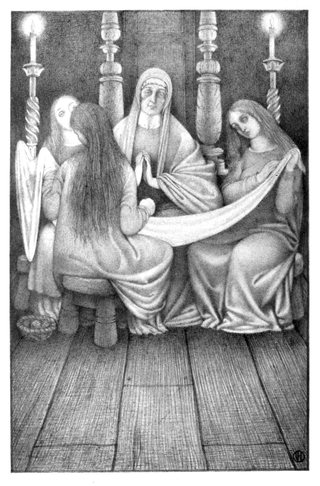Related Research Articles
"Allison Gross", also known as "Alison Cross", is a traditional folk ballad. It tells the story of "the ugliest witch in the north country" who tries to persuade a man to become her lover and then punishes him by a transformation.
"Captain Wedderburn's Courtship" is an old Scottish ballad dating from 1785 or earlier. It is Child Ballad #46, Roud 36. It is known by a number of titles, including "Lord Roslin's Daughter" and "The Laird of Rosslyn's Daughter".
"Lady Isabel and the Elf Knight" is the English common name representative of a very large class of European ballads.

"Lord Thomas and Fair Annet", also known as "Lord Thomas and Fair Eleanor", is an English folk ballad.
"The Twa Magicians", "The Two Magicians", "The Lady and the Blacksmith", or "The Coal Black Smith" is a British folk song. It first appears in print in 1828 in two sources, Peter Buchan's Ancient Ballads and Songs of the North of Scotland and John Wilson's Noctes Ambrosianae #40. It was later published as number 44 of Francis James Child's English and Scottish Popular Ballads. During the 20th century, versions of it have been recorded by a number of folk and popular musicians.
The Gay Goshawk is a traditional English-language folk ballad.
Leesome Brand is an English-language folk song.
The Bent Sae Brown is an English-language folk song.
"Willie's Lyke-Wake" is an English-language folk song.
Willie and Lady Maisry, also known as William and Lady Marjorie, is an English-language traditional folk song, likely originating in Scotland. In the liner notes to folk musician Joe Rae's recording of this song, Rod Stradling writes that "Joe believes that the ballad is set in the area around Selkirk—possibly at Thirlstane Castle, in Lauderdale, to the north-east of Selkirk."
The Grey Cock or Saw You My Father is one of the famous English/Scots Child ballads and is sometimes known as The Lover's Ghost.
"The Cruel Brother" is a folk song.
The Knight's Ghost is a traditional English-language folk ballad. It tells the story of a woman who learns that her husband has died in battle, after which she locks his men in a cellar and throws the keys in the sea. Her husband's ghost appears to ask that she release his men, assuring her they fought bravely. Francis Child drew the ballad from Buchan's Ballads of the North of Scotland.
Sweet William's Ghost is an English ballad and folk song which exists in many lyrical variations and musical arrangements. Early known printings of the song include Allan Ramsay's The Tea-Table Miscellany in 1740 and Thomas Percy's Reliques of Ancient English Poetry in 1765. Percy believed that the last two stanzas of the version he published were later additions, but that the details of the story they recounted were original.
"The Carnal and the Crane" is an English Christmas carol. It depicts a conversation between two birds—apparently, although the species of the "carnal" has never been identified with any certainty, though crow is generally assumed.
"Walter Lesly" is a traditional English-language folk ballad.
Clerk Saunders is an English-language folk song, likely originating somewhere in England or Scotland. It exists in several variants.

"The Twa Brothers" is a traditional ballad existing in many variants.
"Proud Lady Margaret" is an English-language folk song.
Thomas o Yonderdale is an English-language folk song, catalogued as Child ballad number 253 and Roud number 3890. Child assessed that this "apocryphal" ballad seemed like a recent fabrication from a pastiche of other ballads.
References
- ↑ Francis James Child (1898). English and Scottish Popular Ballads. Boston, Massachusetts, USA: Houghton, Mifflin and Company . Retrieved 25 August 2012.
- ↑ "Willie's Fatal Visit (Roud 244; Child 255)". mainlynorfolk.info. Retrieved 2024-09-04.
- 1 2 James Porter (1995). Jeannie Robertson - Emergent Singer Transformative Voice. Knoxville, Tennessee, USA: University of Tennessee Press. p. 252. ISBN 9780870499043 . Retrieved 25 August 2012.
- ↑ Buchan, Peter (1875). Ancient ballads and songs of the north of Scotland hitherto unpublished. Vol. 2 (reprint ed.). W Paterson. p. 247. Retrieved 25 August 2012.